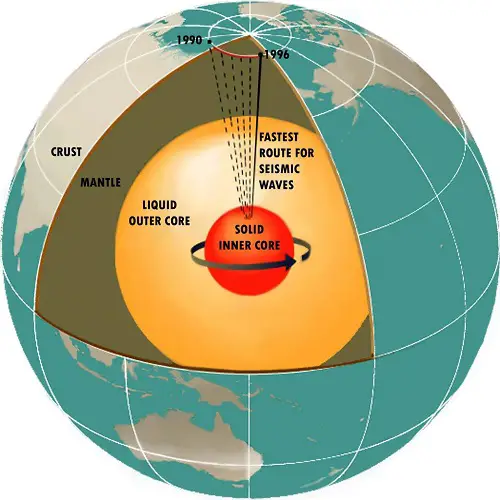Translate this page to any language by choosing a language in the box below.
 According to two Chinese researchers at Peking University, the Earth’s inner core may have temporarily stopped rotating relative to the rest of the planet.
The research is reported in the January 23, 2023 edition of "Nature Geoscience". Further, the researchers, Dr. Xiaodong Song, a seismologist at Peking
University in Beijing and Yi Yang, also a seismologist at Peking University, say the inner core may also be reversing the direction of its rotation or spin.
They say that their analysis of seismic records indicates this happens every 70 years. They base this conclusion on their analysis of earthquake-driven seismic
waves as they passed through the Earth.
According to two Chinese researchers at Peking University, the Earth’s inner core may have temporarily stopped rotating relative to the rest of the planet.
The research is reported in the January 23, 2023 edition of "Nature Geoscience". Further, the researchers, Dr. Xiaodong Song, a seismologist at Peking
University in Beijing and Yi Yang, also a seismologist at Peking University, say the inner core may also be reversing the direction of its rotation or spin.
They say that their analysis of seismic records indicates this happens every 70 years. They base this conclusion on their analysis of earthquake-driven seismic
waves as they passed through the Earth.
This could impact the length of Earth’s days and its magnetic field. The earth's inner core is very dense, made of heavy metals, super heated and about 75% the size of the moon. It is thought to have concentrated there during the early period of earth's formation. The outer core is more fluid and spins at a slightly different speed. The outer core is responsible for Earth's magnetic field. The iron inside the liquid outer core spinning produces the electric currents that create the magnetic field. The earth's magnetic field, which shields the earth from much deadly cosmic radiation, such as that from the sun.
The dense core and its spin also help to produce stability of the earth's orbit and rotation, producing the stable days and nights.
The intense heat of the inner core is produced by the massive pressure and nuclear reactions. This heat keeps the outer core and magma liquid and produces convection currents, which are also affected by the earth's spin. These convection currents result in tectonic plate movement.
See this page for much more information about the earth's layers, core and structure.
Any changes of these, as one would obviously realize, could greatly affect weather and climate. Any changes can have profound affects on both short term weather and long term climate. Other researchers say reversal of the inner core rotation would shorten the length of the day by a fraction of a millisecond over the course of a year and would only have a small effect on Earth’s magnetic field
A cautionary note: This sounds like the plot of one of the worst sci-fi disaster movies ever made: "The Core", released in 2003.
Other scientists, such as John Vidale, a professor of earth sciences at the University of Southern California, say there, even if the data is accurate, there may be an entirely different conclusion.
Dr. Vidale said:
“The changes they noticed are valid although what’s actually happening isn’t so clear. They have a very good analysis and the theory they put in the papers is probably as good as anything at the moment, but there are several competing ideas as well.”
Time will tell if this is accurate or significant.
Many references are included by embedded links to the sources in the text above. Below are others:
Ways to save money AND help the environment:
Eat healthier AND save money: Instant Pot Duo Crisp 11-in-1 Air Fryer and Electric Pressure Cooker Combo with Multicooker Lids that Fries, Steams, Slow Cooks, Sautés, Dehydrates
Save water AND money with this showerhead adapter, it lets the water flow until the water is hot, then shuts off water flow until you restart it, ShowerStart TSV Hot Water Standby Adapter
Protect your health with these:
Mattress Dust mite-Bedbug protector, 100% Waterproof, Hypoallergenic, Zippered
Handheld Allergen Vacuum Cleaner with UV Sanitizing and Heating for Allergies and Pet, Kills Mite, Virus, Molds, True HEPA with Powerful Suction removes Hair, Dander, Pollen, Dust,
Immune Support Supplement with Quercetin, Vitamin C, Zinc, Vitamin D3
GermGuardian Air Purifier with UV-C Light and HEPA 13 Filter, Removes 99.97% of Pollutants
5 Stage Air Purifier, Features Ultraviolet Light (UVC), H13 True Hepa, Carbon, PCO, Smart Wifi, Auto Mode, Quiet, Removes 99.97% of Particles, Smoke, Mold, Pet Dander, Dust, Odors
Interesting Reads:
THE PREPPER'S CANNING & PRESERVING BIBLE: [13 in 1] Your Path to Food Self-Sufficiency. Canning, Dehydrating, Fermenting, Pickling & More, Plus The Food Preservation Calendar for a Sustainable Pantry
The Backyard Homestead: Produce all the food you need on just a quarter acre! Paperback
The Citizens' Guide to Geologic Hazards: A Guide to Understanding Geologic Hazards Including Asbestos, Radon, Swelling Soils, Earthquakes, Volcanoes
The Uninhabitable Earth: Life After Warming
Book: The Sixth Extinction: An Unnatural History Paperback